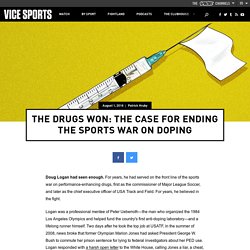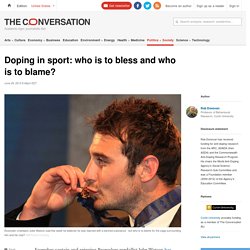

The Drugs Won: The Case for Ending the Sports War on Doping. Doug Logan had seen enough.

For years, he had served on the front line of the sports war on performance-enhancing drugs, first as the commissioner of Major League Soccer, and later as the chief executive officer of USA Track and Field. For years, he believed in the fight. Logan was a professional mentee of Peter Ueberroth—the man who organized the 1984 Los Angeles Olympics and helped fund the country's first anti-doping laboratory—and a lifelong runner himself.
Two days after he took the top job at USATF, in the summer of 2008, news broke that former Olympian Marion Jones had asked President George W. Bush to commute her prison sentence for lying to federal investigators about her PED use. SHIN SPLINTS REDUX: May the Best Meds Win. Doping in sport: who is to bless and who is to blame? Essendon captain and reigning Brownlow medallist Jobe Watson has admitted that he believes he was injected with the banned substance AOD-9604.

The anti-obesity drug is at the centre of the ASADA investigation into the supplements program at Essendon during 2012. While some have called for Watson to return his Brownlow Medal, others believe he has no case to answer, arguing that the club should be held accountable for the welfare of its players. The admission reignites a debate central to the issue of drugs in sport: is it the athlete - in this case Watson - who should pay the price for his indiscretions? Or does the onus of blame belong to a higher power? Media commentary on doping scandals has largely focused on individual athletes and ignored the systems and environments in which they train and compete. The Lance Armstrong case is a classic example with a huge backlash against Armstrong himself. And what of government? Michael Rosenberg: Time for a rule change: College football players should be paid.
Roller Derby. Question d'économie politique : pourquoi certains pays raflent la mise au JO ? Qu’est-ce qui détermine la force sportive d’une nation aux Jeux olympiques ?

Pourquoi tel ou tel pays semble bien plus fort que d’autres et domine allégrement la compétition ? Qu’est-ce qui explique que la Russie, la Chine ou les États-Unis apparaissent comme des monstres de réussite au moment des Olympiades ? La science économique a, depuis longtemps, essayé de déterminer les variables explicatives des performances sportives. Déjà, en 1972, l’économiste américain D.W. Ball avait tenté de pronostiquer la réussite aux Jeux olympiques d’été de Munich et aux Jeux d’hiver de Sapporo, au Japon, à partir du PIB par habitant. . « En fait, une population plus riche a généralement davantage de temps et de ressources à octroyer aux loisirs, ce qui favorise la pratique sportive de la population et donc l’émergence d’athlètes de haut niveau.
Ainsi, un pays riche devrait avoir une chance significative de performer aux olympiades brésiliennes. L’importance du politique Une révélation du dopage. Expert opinion: What about an athlete's right to privacy? Paul Dimeo looks at another side of the anti-doping fight, the right to privacy for athletes The disappointment shows on Lizzie Armitstead's face she crossed the line in fifth in the women's Olympic road race.

Photo: Yuzuru Sunada Lizzie Armitstead almost lost her place in the Olympics after missing three anti-doping tests. She found herself under pressure to explain the reasons, which included a personal family matter. While much of the debate focused on the consistency of the appeals process, the reality hardly discussed is the level of personal surveillance to which athletes are subjected and the invasion of their privacy — unparalleled in any other walk of life. An athlete selected for the Registered Testing Pool (RTP) must register a time slot of one hour per day between 5am and 11pm during which they can be found and potentially tested.
They must be in that location for the full hour, but can inform their national anti-doping authority of any last-minute changes to their plans. « Les arènes totalitaires :Hitler, Mussolini et les Jeux du stade » Le sport est en pleine expansion dans l’entre deux guerre, et ceci aussi bien dans les pays démocratiques que dans les pays totalitaires.

Mais en Italie et en Allemagne, le sport devient « une technique privilégiée pour uniformiser les pensées et les comportements ». Daphné Bolz note que ce phénomène a été d’autant plus dangereux qu’il s’exprimait de la façon la plus efficace : « l’imperceptibilité ». Si les liens entre sport et totalitarisme nous sont familiers, Daphné Bolz s’intéresse à un aspect méconnu : l’architecture sportive. Loin d’être des espaces neutres idéologiquement, ils sont selon elle l’expression « concrète du politique « Four Years A Student-Athlete: The Racial Injustice of Big-Time College Sports.